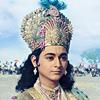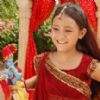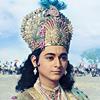I too agree with all of you, and I put the blame solely on Gajendra Chauhan's monotonous dialogue delivery... always sounded like a kindergartener giving a speech to the parents on Annual day 🤔 On that note, here's a wonderful translation of a speech given by my current fav Hindi author Narendra Kohli on the dhyut krida that does a much better job at explaining the character and his noble way of thinking:
http://www.narendrakohli.org/The_Dice_Match.html
In case it doesn't open:
Presented at the International
Seminar on Mahabharat organized by Sahitya Academy, Delhi, India: April
2004
The Dice
Match
-Narendra
Kohli
When DharmaRaj Yudhishthir had Maya danav
build his assembly, he conducted the Rajsooya Yagya and for the
benefit
of humankind, gathered scholars and distributed the riches collected
from
various kings amongst scholars, Brahmans, intellectuals and the
needy.
As a reaction to this, the Toransphatic
assembly hall that Duryodhan constructed, I think, was something
like a
modern casino, where gambling was the only form of entertainment. There
could
have been no spiritual discussions, no worship or praying, no yagya-havan,
no deliberation, and no exchange of higher thoughts and beliefs here.
The only
sport that could take place was gambling. Certainly, many famous and
dissolute gamblers
would have come to participate. The kshatriya society depicted
in
Mahabharat is in general fond of gambling. Thus as evidence of his
distinction,
Duryodhan had the Toransphatic hall built for the purposes of
gaming.
Yudhishthir was not only an emperor and leader amongst kings; he was
also the
eldest amongst the children of Pandu and Dhritarashtra. Therefore,
seeing him
gamble, the general impression is that he too must have been an addict
of
gambling. At Abhimanyu's wedding in the city of Upaplavya, Balram
accuses him
of the same and holds him responsible for his losses.
Before coming to Hastinapur, there has been
extensive
discussions between Vidur and Yudhishthir in Indraprastha, where
Yudhishthir
has opposed gambling in the strongest terms. After reaching Hastinapur,
an
entire chapter is dedicated to Yudhishthir's argument with Shakuni,
where
Shakuni defends gambling and Yudhisthir opposes it.
1.
"Gambling causes quarrels and brawls. No
intelligent person
would like to gamble…"[2]
2.
"I have no desire to gamble."[3]
3.
"Gambling is a form of deception and a cause for
sin. One can
neither demonstrate valiance suitable to a kshatriya, nor are
there any
set rules for it."[4]
No addict criticizes his addiction. According to
Mahabharat,
Yudhishthir had not the slightest knowledge of gambling. He has never
been
shown gambling prior to Hastinapur's gaming hall either. After losing
everything, as they are leaving for the forest, the Pandavas are
worried about
Dhritarashtra calling them back and asking them to play again. If that
happens,
they may win Pandava's weapons as well. That will leave the Pandavas
defenseless and helpless. This is why Yudhishthir learns gambling and
acquires
equestrian knowledge from Muni Brihadshva the first opportunity
he gets
on the way to the forest. Only after learning how to gamble is he able
to live
undetected as Kank in Virat's court as his attendant.
It is very hard for me to accept that some one who
doesn't
know how to gamble could be addicted to it. But still, we see that not
only does
he gamble at this assembly, he gambles till the end; and gets up only
after
losing everything. There has to be an explanation for this behavior of
his.
One particular utterance of Yudhishthir is quoted
over and
over in many discussions. Where he says, it is wrong to gamble, it
causes
complete destruction, but if he were invited, he would not refuse. Many
people
have accepted in their commentaries on this quotation that it was
Yudhishthir's
duty (dharma) as a kshatriya. As a kshatriya
never refuses
a challenge in battle and gambling. But we must pay attention to the
fact that
Yudhishthir has never expressed his kshatriya duty (dharma)
or
pride. His concern wasn't kshatriya dharma, but just dharma.
As
far as battle for kshatriyas is concerned, at one point during
the
battle of Mahabharat, Yudhishthir has been depicted deserting in
defeat. This
is why Yudhishthir criticizes this addiction of kshatriyas.
Here, the
word used in the context of an invitation for gambling is 'aahuut'
which should be interpreted not as a
challenge but as a call by Dhritarashtra. Dharmaraj
(Yudhishthir) and
his brothers are the sort of people who are willing endure the biggest
tests in
order to prove their smallest obligation to dharma.
Thus Yudhishthir sits down to gamble in
accordance
with respect for Dhritarashtra's invitation despite being fully opposed
to it
in his heart.
In Mahabharat, the word 'uncle' has been used
nowhere for
Dhritarashtra in Pandava's context. He has been called pita
(father) in
the original verses. Although pita means 'care-taker' and there
is no
doubt that in Pandu's absence, it was Dhritarashtra who was as a father
to the
Pandavas, but while leaving for Varnavat, it was said about the
Pandavas: sarvaa
maatristatha aprichhya kritva chaiv pradakshinat.[5]
Here, taking permission of the mothers is mentioned. We know that
besides
Kunti, Pandu had only one other wife – Maadri. She had already passed
away.
Still the word 'mothers' is used in plural. The word refers to Gandhari
and
Vidur's wife. This means that they considered their father's brothers
and their
father at the same level, equivalent and substitutable. And accepted
their
aunts as their mothers. This wasn't just for the sake of addressing.
Even in
behavior, they accepted these relations. In such a condition, for
Yudhishthir,
every instruction of Dhritarashtra's was an instruction from his
father.
Swami Vivekanand once said that there are many
forms of dharma
and it manifests itself in different forms in different people. Some
one's dharma
may be in truth, another's in actions (karma), another's in
obedience,
in service, in keeping their word etc.
Yudhishthir's was in his truth, and in fulfilling the wishes of
elders.
Therefore, knowing that Dhritrashtra could rob him of his life, or
knowing that
Dhritarashtra wants Duryodhan to be the ruler of Hastinapur – even if
that
requires killing the Pandavas, Yudhishthir does not disobey any of
Dhritarashtra's commands. He follows his father's commands with the
same
sincerity as Ram follows Dasharath's. From the perspective of a common
man,
this may be Yudhishthir's stupidity, but Yudhishthir's character has
not been
constructed from a common man's perspective. He is dharma raj.
He will
follow his dharma not just by sacrificing his wealth, but his
life if he
has to. While he may be able to engage in debate with Dhritarashtra, he
cannot
refuse to follow his command. Yudhishthir seems bound by this
commitment to his
dharma during the betting that took place in the gaming hall.
He
is
constantly opposing gambling, but never refuses to play. As that was
Dhritarashtra's command.
The opposition between spirituality and this world
is
apparent. A man of worldly success may spiritually prove to be a being
of the
lowest grade. And a spiritually developed advanced soul appears stupid
from a
materialistic perspective. Yudhishthir's character too is an extremely
spiritually developed and is continuously growing. His ideals are not
worldly,
but spiritual.
After Vidur warns him in Indraprastha, he says in
clear
words, "On command of King Dhritarashtra, I certainly wish to partake
in the
games. A father is always dear to a son."[6]
After arriving in front of Dhritarashtra, he again says, "Sire! You are
our
lord. Command us what we should do. Bhaarat! We always wish to
remain
under your direction."[7]
He is willing to handover the entire kingdom to Dhritarashtra even
after
winning the war of Mahabharat, because father is the lord, and a son is
under
his command.
The reader takes a sigh of relief when Yudhishthir
regains
his wealth and rule as a boon from Dhritarashtra after having lost
everything
once, and Draupadi has been fully humiliated. But Yudhishthir is called
back
again, and again he sits down to gamble. Every ordinary reader wonders
why this
madness? The reason for him to gamble a
second time is the same as what it originally was – his father's and
king's
command:
- "Jewel amongst
Bharat's descendents
and son of Pandu Yudhishthir! Your father King Dhritarashtra has
instructed you to return. Our assembly is once again complete with its
members and is waiting for you. You shall throw the dice and gamble."[8]
- Yudhishthir Said, "All
creatures
attain auspicious and inauspicious results by the inspiration of God.
No one can evade them. It appears I will have to gamble again. This
invitation to gamble by the command of Old King Dhritarashtra is the
cause of our family's destruction. Even as I know this, I cannot
disobey his order."[9]
- "… While listening to people
say all
sorts of things, King Yudhishthir due to fear of shame and with the
perspective of his dharma in following Dhritarashtra's command
started to gamble once again."[10]
By gambling, he obeyed his father's command. Why
was it then
necessary to play till the end and get up only after total destruction?
He
could have gotten up at any time. When searching for the answer to this
question, Vidur's behavior comes to my attention. He was the biggest
benefactor
of the Pandavas. He opposes gambling vigorously. He appeals to
Dhritarashtra
repeatedly to stop the game, but not once does he say to Yudhishthir,
"that is
enough. Son! Leave the game and get up."
What does this mean? Clearly, the game has been
started by
the king's command, and only by his command can it be paused or ended.
Without
his permission Yudhishthir cannot leave the game, and as he plays, he
must
wager something. During this process it appears that this gambling
continues to
the end like a duel. A duel ends with the death of one of the fighters.
Similarly this gambling can end only after one side has lost every
thing. The compulsion
that's making Yudhishthir play is clear. Therefore while he still has
any
wealth of any kind, he cannot leave the game. Perhaps this is why he is
in a
hurry of sorts to lose every thing as quickly as he can, given he can't
win.
May the gambling end so he may get up.
Knowingly, he loses everything and stops. He has
already
lost his brothers and his own self. As he loses himself, Shakuni says
to
Yudhishthir, "Sire! To wager yourself and to lose is an act of extreme
impiety
(adharma). It's a great sin to wager yourself while you still
possess
wealth. Sire! Your dearest Draupadi is such a hand that you have not
yet lost.
Thus wager Krishna and by her, win yourself back."[11]
This means that even if a gambler wishes to save some of his money, he
can't.
This is improper. Considering this fact, one can begin to understand
Yudhishthir's situation and the rules of dharma and propriety
that bind
him. He came to Hastinapur with goodwill and love in his heart. He
wanted to
remove the disharmony between the Pandavas and Kauravas. He remembered
Vyas'
warning and it wasn't uncommon for violence to erupt due to
disagreements
during gambling. Rukmi's killing at the hands of Shri Krishna's elder
brother
Balram is an example of just that. Yudhishthir would not have wanted to
give
Duryodhan and his friends the opportunity to start trouble by accusing
the
Pandavas of not following gambling's decorum. Not only would that lead
to the
end of any goodwill and love that he came looking for, but would also
become a
reason for the destruction of the kshatriyas, and the calamity
that Vyas
had expressed a concern for in thirteen years, would present itself
right then
and there.
It is worth noting that dharma raj Yudhishthir
is
following
his dharma even while gambling, while vulpine and
deceiving
Shakuni is accusing him of being improper. As a response to this
Yudhishthir
immediately wagered Draupadi and by losing, while protectinghis
dharma
he earned that disgrace that the society has still not been able to
forgive.
Every act of dharma raj Yudhishthir is for
the
protection of dharma. If he did not partake in the game, that
would have
been disobeying his father's command, which is wrong. He could not have
disregarded the invitation as that would be disregarding his father.
That would
have been violation of his father's command. He could see that
Duryodhan,
Dhritarashtra and Shakuni had trapped him in the web of his own dharma
and having surrounded him from all sides, were hunting him. He still
did not
even think about violating his dharma, break the peace and gain
his
freedom or protect his wealth and kingdom by physical strength.
As soon as he loses the first hand, Yudhishthir
says to
Shakuni, "Shakuni! Shakuni!! You defeated me in this hand by cheating."[12]
It has not been explained though how Shakuni cheated. There are a
number of
things of this sort that have not been clarified in Mahabharat. I think
if we
analyze those circumstances, we can draw a few conclusions. If
Yudhishthir had
played against Duryodhan, it is possible that Yudhishthir – who does
not know
the game, may not have been slaughtered as badly as he was playing
against
Shakuni. Throughout this game Yudhishthir never got the dice. From the
beginning till the end it is Shakuni who kept throwing the dice and
kept
winning Yudhishthir's money. Why did Shakuni play on Duryodhan's
behalf, and
why wasn't a skilled gambler used on Yudhishthir's side is not
explained in
Mahabharat. Yudhishthir doesn't even object on this matter. Possibly
there was
a tradition at the time – just as a general conducts wars on the king's
behalf,
perhaps a skilled gambler always played for the king. But Yudhishthir
didn't
bring a skilled player with him because he didn't go there to gamble.
He had
come to participate in a family event or gathering on his father's
invitation;
and was coerced into playing. Perhaps he didn't realize at the time
that
Dhritarashtra would not order the game to end at all.
Before each hand Yudhishthir says that this wealth
is mine,
and I wager it as I play with you. This is not a trivial statement.
This means
that a gambler may wager only his money. Neither may he bet some one
else's
property, nor can he withdraw from the game while he still has any
wealth
remaining. On one hand Yudhishthir takes almost an oath before each
hand
declaring his wager, on the other, Shakuni is not playing with his own
money,
and even Duryodhan doesn't clarify what his wager is. When Yudhishthir
asks,
"In return to this, what money do you wager by which you play against
me?"[13]
Duryodhan replies, "I have many gold coins and a lot of wealth too. I
am not
arrogant about my riches. First you win this hand."[14]
Clearly, neither do Shakuni and Duryodhan play by the rules, nor is
there any
clarity anywhere in their wagering. There is a curtain of deceit on
everything
they do. There is enough room for them to prevent any serious harm to
them, in
case the game doesn't go their way for any reason. They were cleverly
robbing
Yudhishthir, and Yudhishthir was following his dharma.
2
If a gambler must wager only his wealth, then one
has to
consider what is the definition of wealth? If we draw conclusions just
from
Yudhishthir's statements, then the land of the kingdom, its treasury,
its
subjects, armies, even the ornaments on the bodies of the other
Pandavas – all
come under the king's wealth - Yudhishthir's wealth. The only exception
to this
is the land granted to the Brahmans as a source of their
income. Even amongst the subjects, Brahmans
are not considered wealth of the king. It appears that only the
intellectuals –
academia, students and scholars and their wealth are not the king's
wealth.
They are independent. On the other hand, the head of a household is the
lord of
his household. Therefore his wife, children, younger brothers and their
wives
are also his wealth.
This is why a person as short tempered and
noncompliant as
Bheem sees and understands everything, but does not oppose Yudhishthir
because
rightfully he is Yudhishthir's wealth. If he objects, he does not
follow his dharma.
In this entire episode, while Yudhishthir has followed his dharma,
the
rest of the Pandavas and Draupadi have not once sacrificed their own dharma
while disagreeing with Yudhishthir's policy.
Even when Duhshaasan drags a menstruating Draupadi
into the
assembly by her hair, wrapped in nothing but one cloth, she never
challenges
Yudhishthir's right to wager her during the game. At most she asked if
Yudhishthir wagered her first, or did he lose himself before hand. She
analyzes
dharma within the confines of the socially accepted propriety
while
remaining within the bounds of social morals herself. If Yudhishthir
lost
himself first, then he had become a slave of Duryodhan. In such a
circumstance,
a slave has no authority over a Queen, princess or a free woman. If
Yudhishthir
had already lost himself, then it was not right to wager Draupadi.
Shakuni did
say that it was wrong of Yudhishthir to lose himself while he had
wealth
remaining, but he did not say that Yudhishthir couldn't bet Draupadi
any more.
Instead he enticed Yudhishthir to wager Draupadi on the next hand and
resolve
himself of his impropriety.
Bheeshma's dilemma too was based on the same
question. Just
as Draupadi does not challenge Yudhishthir's right to bet Draupadi on a
hand,
Bheeshma too does not consider a wife outside of her husband's
lordship. Thus,
when Yudhishthir had the right to wager his brothers because they were
his
wealth, he also had the compulsion to wager Draupadi, because she too
was his
wealth. But at the time when Yudhishthir wagered Draupadi, he wasn't a
free man
himself. When Draupadi asks Bheeshma what is dharma, he is
unable to
answer clearly. He says the nature of dharma is extremely fine.
Amongst
the Pandavas' reaction, the most aggravated is Bheem's. He says,
"Brother
Yudhishthir, women in gamblers' houses are generally indecent, but even
they
don't wager them during gambling. They have pity in their hearts even
for those
unchaste women. Our enemies have made us bet, and have taken from us
all the
wealth and exceptional beverages that King of Kashi gave to us as a
gift,
jewels that other kings had presented to us, our vehicles, luxuries,
shields,
means of war, kingdom, your body and all of us brothers. But this is
not what
makes me angry, as you are the lord of everything of ours. But wagering
Draupadi, this I consider extremely inappropriate. That innocent and
nave lady
did not deserve to be insulted in this manner, being married to the
Pandavas.
But because of you thse lowly monstrous Kauravas with no ability to
control
their passions are causing her all sorts of pain. Sire! I direct my
rage upon
you for her poor condition. I will burn both your arms. Sahdev! Get
fire."[15]
Bheem may have expressed all his anger against Yudhishthir, but he
never said
Yudhishthir did not have the right to bet Draupadi. He does say that
Draupadi
should not have been wagered, as he is unable to bare the grief
Kauravas have
inflicted upon her, but there is no challenge to Yudhishthir's
authority
anywhere.
In this manner this entire episode has been
presented as a
question of dharma. This dharma
is based on the practices and authority accepted by the society. As a
part of
this dharma, the question of the duty of all the brave men
gathered to
protect a woman being publicly humiliated has not been raised anywhere.
As
opposed to this, when Jayadrath abducts Draupadi in the forests, not
only do
the Pandavas fight him, but after making him suffer in all ways they
let him
live only because he is married to their sister Duhshalaa. In this dharma,
the entire discussion, analysis and activities are focused on the
issues of
authority and property. As his wife, if Draupadi is Yudhishthir's
wealth, and
if Yudhishthir can't withdraw from the game while wealth remains, then
Yudhishthir was required to wager his wife as wealth. Similarly it was
improper
to not accept Duryodhan's right on lost wealth. This is why the
Pandavas do not
raise their weapons to defend their wife or their own dignity despite
having
the will and the capability to do so.
In the age that regarded the rules established by
the
society as the social dharma, Shri Krishna seems to be the only
exception. He doesn't care if Yudhishthir wagered himself first or
Draupadi.
What he cares about is that Draupadi was publicly humiliated. Perhaps
this was
the point of view that developed into a society that no longer
considered the
wife, children and younger brothers and sisters as property of their
husband,
father or elder brother. No person was the property or wealth of
another
person. Subsequently, slavery too was abolished and now that we live in
a world
where we have no right to torment even our animals, how can one person
be
considered the property of another.
In this context, another interesting question that
comes up,
is that for whatever reasons, without having forfeited Draupadi, the
last hand
has now been played as Yudhishthir wagered himself and lost thus
becoming
unqualified to continue gambling, what would have happened if he had
refused to
wager Draupadi? Even if Yudhishthir had not wagered Draupadi after
losing his
own self, as property of a slave, Draupadi would still have been
considered a
slave of Duryodhan. Potentially, the reason Yudhishthir did wager
Draupadi even
after losing himself was because he could not have protected her
despite not
having lost her. But while a slave himself, as he wagers Draupadi, a
new
circumstance is created. The basis for Draupadi's dharma
related
arguments in the end appear to have been deliberately presented by
Yudhishthir.
The question is, when Yudhishthir had already lost himself, and
Draupadi was
still left, where was the need to wager her? He could have argued that
a slave
does not have the right to wager a free citizen. But he still wagered
her. Why?
If Draupadi had not been wagered, Duryodhan would
have
argued that a slave's wealth is the master's wealth, thus even without
being
explicitly wagered, Draupadi is his property. All other wives of the
Pandavas
and their children could have been considered Duryodhan's property by
this
logic. Despite being the wealth of a slave if Draupadi is wagered – and
this
proposal came from Shakuni in the haste to win Draupadi – clearly means
that
Duryodhan has no authority over other wives and children of the
Pandavas. They
were not wagered and lost. By wagering Draupadi after losing himself,
Yudhishthir secures Pandavas' other wives and children. And this gamble
of his
becomes Draupadi's shield as well. Had she not been wagered, she would
have
been considered Duryodhan's property regardless. The explicit wagering
now
provides her with the argument that she could not be considered
Duryodhan's
wealth until she was wagered and lost. As Yudhishthir had already lost
himself,
he had no right to wager her. Not just Draupadi, but all Pandavas won
their
freedom back on the basis of this logic. The act of wagering the
remaining
wealth – Draupadi – was a strategic move by Yudhishthir within the
rules of the
game, which protected Draupadi and the Pandavas. In that whole game
this was
the only hand that Yudhishthir won against Shakuni. Otherwise he had
lost the
whole game.
Draupadi did not win this debate just on the basis
of her
logic. It was not possible to win any argument by logic in
Dhritarashtra's
assembly, in the presence of Duryodhan's goons and friends. In this,
Shri
Krishna's demonstration of power is extremely clear. Shri Krishna
doesn't
consider the contemporary social beliefs to be the extent of dharma.
He
goes to the humanity of dharma and periodicity has no relevance
for him.
Time and place do not pose any boundaries for him. In Draupadi's case
too
Duryodhan had already neutralized her arguments with his brute force.
All
appeals made to the elders of the family for justice and dharma
too had
been fruitless. A family-senior like Bheeshma was entangled with the
applicability and symptomatic subtleties of dharma. That is
when
Draupadi while reminding everyone of her importance issues almost a
warning -
there may be trouble in the future if she is not treated justly. She is
not
just a commoner who they could treat unfairly and go unpunished. As
evidence to
her importance she declared she is Drupad's daughter, Dhrishtdyumna's
sister,
Pandu's daughter-in-law, Pandavas's wife and Shri Krishna's friend. No
word or
name uttered by her had an impact on Duhshaasan while he was pulling
away her
clothes; but as soon as Shri Krishna's name came up, his hands went
numb. His
energy vanished. His head started to spin, and inanimate, he fell to
the ground. This is what I consider Shri
Krishna's
demonstration of power. Duhshaasan had witnessed the killing of
Shishupal by
Shri Krishna's Sudarshan chakra at Indraprastha's assembly in
the
presence of many kings. Forget revenge or punishment - no one even
objected to
Shri Krishna's act. Duhshaasn saw that same Sudarshan chakra
lurking in
his own assembly. When Draupadi mentioned that she is a friend of Shri
Krishna,
Duhshaasan realized that though they could protect themselves from the
Pandavas
under the cover of dharma's apparatus, social traditions and
the decorum
of gambling after inflicting all sorts of suffering on them, but no one
can
save them from Shri Krishna. His hands shuddered and his head spun as
he saw
his end right in front of him. Another thing about Shri Krishna is
emphasized
right here – he cannot tolerate any insult to women under any
circumstances.
His Sudarshan chakra became active at Pandava's assembly when
Shishupal
started to prate about Rukmini, and in Kaurava's own assembly too, it
presented
itself when Draupadi was being humiliated.
-
Narendra Kohli, 175
Vaishali, Pitampura, Delhi 110088.
[1]
According to
the
Mahabharat, name of the building where the gambling
occurred.
[11]
30-32/65,
Sabha
Parva
[13]
etad
rajan mama dhanam pratipanoasti kastava.
Yepa mam tvam maharaja dhanena
pratidivyaye.. 7/60,
Sabha Parva
[14]
Santi me
manayashchaiva dhanani subahuni cha.
Matsarashcha n me artheshu jayasvainam
durodaram.. 8/60,
Sabha Parva
[15]
1-6/68, Sabha
Parva


















comment:
p_commentcount